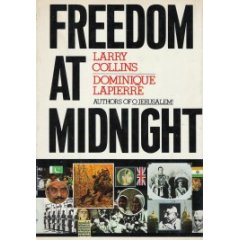 I am glad that while in the course of traveling through India I stumbled upon the book "Freedom at midnight" co-authored by Dominique Lapierre and Larry Collins. Reading into their nearly hour-by-hour account of every major and minor event that made India's independence possible, while at the same time traveling within the society that is in large part a result of those events has been a unique way to gain perspective on what is in many ways the most remarkable independence struggle in history. The book is a worthy companion to anyone who is trying to understand the historically strange story of how the people of India gained their independence.
I am glad that while in the course of traveling through India I stumbled upon the book "Freedom at midnight" co-authored by Dominique Lapierre and Larry Collins. Reading into their nearly hour-by-hour account of every major and minor event that made India's independence possible, while at the same time traveling within the society that is in large part a result of those events has been a unique way to gain perspective on what is in many ways the most remarkable independence struggle in history. The book is a worthy companion to anyone who is trying to understand the historically strange story of how the people of India gained their independence.What makes India's eventual defeat of British rule in India so unlike many similar stories of struggle between colonizer and colonized people throughout history is of course the role that non-violent non-cooperation played in it. The thought that one can actually put an end to one's oppression by using methods that demonstrate to one's oppressor that they are unjustly causing suffering, and that this alone could be effective, is a notion that should not be overlooked by anyone proposing to teach valuable lessons in social studies. In no other event in history were as many individuals working with peaceful methods and in unity towards the overthrow of violent domination and oppression. the scale at which it was attempted in India and the variety of tactics which were developed there to achieve it, make the study of India's independence important for every society. As a model it provides an entirely different set of tools for creating positive change. Those strategies are practical for any institution or individual who is inclined to make something which they believe is "bad", be "good", and do so without being what they consider "bad" themselves. Perhaps the most important thing to remember about the history of India's non-violent revolution is - that it worked.
"Freedom at Midnight" tells this story with such attention to detail that it reads like a drama unfolding. These two authors have created a portrayal of this revolutionary event that includes the perspective of every angle, not just the major players.
2 comments:
I'm in!
Aman.
testing
Post a Comment